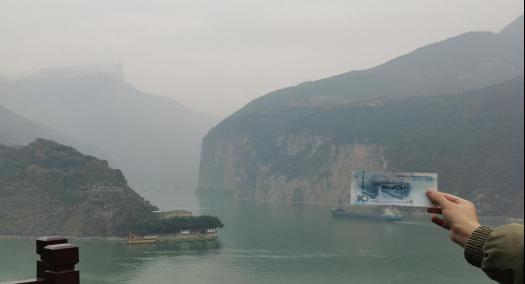【2021 Dancing together in the Yangtze River Economic Belt and Exploring the Millennium Context】
The waters of the Three Gorges Gate are surging and the peaks on both sides of the river are facing each other in the clouds. Surrounded by mountains on one side and surrounded by water on three sides, the White Emperor City has several more vigorous momentum under the mist of rain and river steaming. A few days ago, the reporter followed the "Dancing together in the Yangtze River Economic Belt , Exploring the Millennium Context of the Source" network theme activity interview group to Chongqing Fengjie, to feel the double fireworks from the "Poetry" City.
"Poetry" the historical fireworks in the city
"Among the clouds of the White Emperor, a thousand miles of Jiangling will be returned in one day." After following the interview group into the White Emperor City Scenic Area, the first thing that catches the eye is the "Early White Emperor City" and "Bamboo Branch Words" carved at the entrance. For thousands of years, in the picture of history, the White Emperor City can be described as a rich ink, from the heroic and uninhibited brushstrokes of the poets in the prosperous Tang Dynasty to the worries of the feelings of home and country in the Three Kingdoms of Bashu, this city surrounded by rivers and green mountains has left a thick history with poetry as a carrier.

Three Gorges Gate Zhu Yanyan photo
"In the past, this was a military fortress, and the terrain was more dangerous." Liu Guangyu, the narrator of the scenic spot, introduced, "According to statistics, there are countless battles that have taken place here, the most famous of which are three times, but it is precisely because of this geographical environment that many literati and inkers have left poems." ”
White Emperor Temple Photographed by Zhu Yanyan
In the White Emperor Temple, there are also Ming and Qing Dynasty buildings such as the Wuhou Ancestral Hall, the Ming Liang Hall, and the Stargazing Pavilion. "In this Mingliang Hall, there are statues of Liu Bei, Zhuge Liang, Guan Yu, and Zhang Fei." The tour guide of the White Emperor City Scenic Area introduced, "The Wuhou Ancestral Hall in our White Emperor Temple is the smallest Wuhou Ancestral Hall in China, and inside is the statue of zhuge Liang's ancestors and grandchildren. In addition, there are also the famous Bashu willow leaf bronze sword in the Eastern Zhou Dynasty, the relics of the Qutang Gorge hanging coffin in the Han and Jin Dynasties, and the calligraphy and painting inscriptions since the Sui and Tang Dynasties, pottery and bronze cash cows, among which the "Three Kings Monument" engraved phoenix, peony, and sycamore are exquisite and gorgeous, which can be called treasures.
"Poetry" fireworks in the city
The fireworks of history are like the sparks of stars flashing in the wilderness, and the floating light and shadows will dye the city of Fengjie with poetry. Today, in addition to the fireworks of war and chaos in history, the White Emperor City Scenic Area also divides various poems into three parts. We mainly divide poetry into three parts, namely "Poetry and Scenery", "Poetry and History" and "Poetry and Love". Lei Tingjun, director of the White Emperor City Museum, said, "The corresponding locations are on the Wind and Rain Corridor Bridge, in the White Emperor Temple and in the scenery everywhere in the scenic area. ”
"The boundless falling wood is under the Xiaoxiao, and the Yangtze River is rolling in endlessly." One of Du Fu's poems, "Ascending the Heights", describes the autumn scenery at the mouth of qutang gorge and is known as the "crown of the seven laws". Through the millennia, the entire Fengjie festival today is full of poems written by literati. "There are too many poems in scenic spots, and there are more than 10,000 poems describing Fengjie!" Liu Guangyu said, "In addition to scenic spots, you can go to the street to see, there are poems everywhere." ”
"If a poet comes to Fengjie and cannot write poetry, he is not worthy of being called a poet." Zhao Guilin, director of the Fengjie Poetry City Museum, said with a smile. In the Fengjie Poetry City Museum, which he founded, the past and present lives of Fengjie are loaded, in addition to various kinds of poetry and songs from ancient times to the present, there are also stone tools of the primitive people of the Three Gorges, Han Dynasty wadang, Ming and Qing Dynasty stone carvings, and window ledges of old county towns. In the poetry city of Fengjie, there is the solemnity of history, and there is no lack of the smell of fireworks that melt into the blood.
A corner of the Yusheng community photo by Zhu Yanyan
In the Bamboo Branch Square of Fengjie's Yusheng Community, this breath from the modern poetry city is vividly reflected. "The name of Bamboo Branch Square comes from the 'Bamboo Branch Word'. As we all know, the word bamboo branch originated in Kuizhou, spread in the world, and the essence is in Fengjie. Liu Xin, party affairs officer of Yusheng Community, introduced. With the theme of "Bamboo Branch", Bamboo Branch Square has made 4 layouts along the clockwise direction from the entrance, namely "learning", "research", "sound" and "performance", so that community residents can better learn poetry. "When we built Bamboo Branch Square, we wanted to inherit this excellent traditional culture rooted in the blood of the people of Fengjie, so that it could be 'revitalized' in life and 'spread' among the masses." Wang Qin, secretary of the Party Committee of Yusheng Community, said. (Guangming Daily all-media reporter Li Hong, Zhu Yanyan also contributed to this article)
Source: Guangming Network